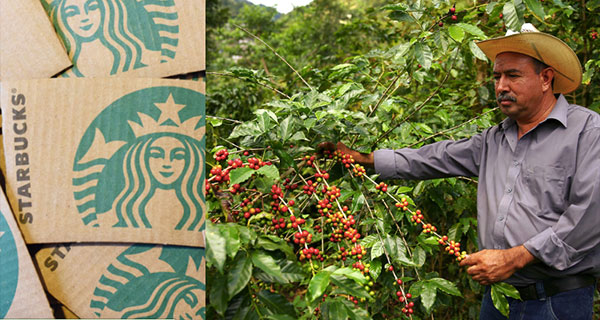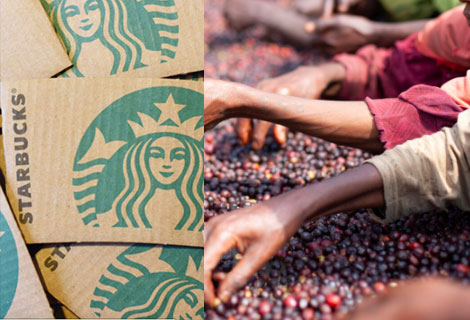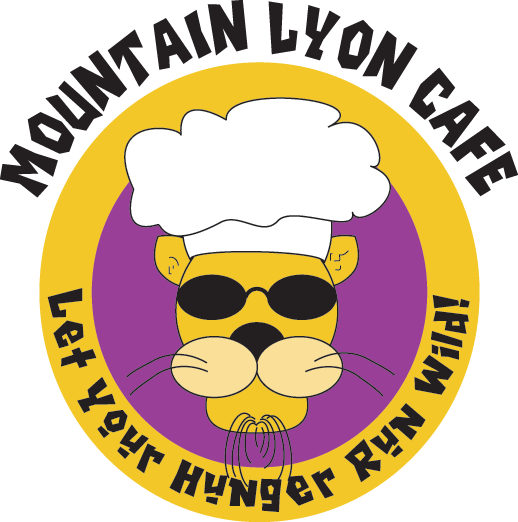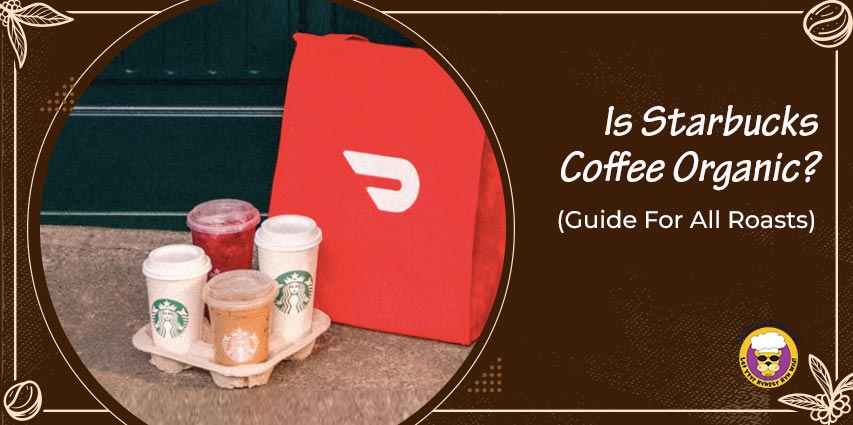The incredible success of Starbucks is no secret. The coffee giant has nearly 30,000 locations worldwide and continues to expand into more international markets each year. Amidst its booming presence in the java industry, however, one question yet remains: Is Starbucks coffee organic? Although much speculation exists surrounding this mystery ingredient, the truth lies somewhere in between organic certification standards and sustainability efforts.
In this blog post, we’ll examine what’s really going on behind those famous green-and-white cups – exploring the facts about organic content, sustainable growing practices, and ecological implications of mass produced coffee. So grab a cup of joe (preferably from a local shop), get comfy with a blanket or two – it’s time to dive deep into understanding whether or not Starbucks coffee can be deemed truly organic.
Is Starbucks coffee organic?

In short, Starbucks coffee is not certified as organic. However, their commitment to sustainability and ethical farming practices have allowed them to produce some of the highest quality coffees available – while simultaneously helping to protect the environment and local communities.
What Coffee Does Starbucks Use?

The coffee beans used in Starbucks beverages are Arabica. This variety is known for its balanced flavor and lower acidity when compared to other types of coffee beans. Arabica also tends to have a sweeter, more delicate taste – making it the perfect choice for lattes and cappuccinos.
What Makes A Coffee Organic?
Simply put, a coffee is considered organic when it is grown without the use of synthetic fertilizers, pesticides, and other chemicals. Additionally, organic farms must follow stringent guidelines regarding water usage and soil preservation- all with the goal of minimizing environmental damage while maximizing quality yields.
In addition to being free from dangerous chemicals and pesticides that can be harmful to humans, organic coffee cultivation is beneficial for the environment. Organic farms create more natural habitats for wildlife and help maintain soil fertility – which is essential for the future of agriculture.
Related article:
Do Starbucks Refreshers Have Caffeine?
Is Starbucks Coffee Genetically Modified?
No, Starbucks does not use any genetically modified beans in their products. They are committed to sourcing only the highest quality ingredients and have a strict policy against using any GMO-based products.
Is Starbucks Coffee Full of Pesticides?
No, Starbucks does not use any pesticides in the production of their coffee. Their stringent standards and commitment to sustainability mean that only the best quality ingredients are used to create their drinks – so you can rest assured that your cup of joe is free from harmful toxins.
Does Starbucks Coffee Have Toxins?
No, Starbucks coffee does not contain any toxins. In fact, all of the beans used in their products are tested for chemicals and pesticides prior to being roasted – ensuring that only the utmost quality product is served to their customers.
Does Starbucks Serve Organic Regular & Decaf Coffee?
Yes, Starbucks offers a number of certified organic coffees including regular and decaf. These beans are grown in accordance with the guidelines set forth by the United States Department of Agriculture (USDA) and are held to the highest standards of sustainability and ethical farming practices.
So Is Starbucks Coffee Organic?
No, Starbucks coffee is not certified as organic. However, the company does employ a number of sustainable and ethical farming practices – ensuring that their coffee is free from dangerous chemicals and toxins.
Why Do People Drink Organic Coffee?
No, Starbucks coffee does not contain any pesticides. The company works closely with their suppliers in order to ensure that only the highest quality beans are being used – meaning that their product is free from dangerous chemicals and toxins.
Top 5 Best Alternatives to Starbucks Organic Coffee
1. Grounds For Change: Offering a variety of certified organic and fair-trade coffees, this company is dedicated to sustainability and ethical farming practices.
2. Campos Coffee: This Australian-based roaster specializes in sustainable coffee that is grown without the use of chemicals or pesticides.
3. Kicking Horse Coffee: This Canadian roaster offers a number of organic and fair-trade options that are ethically sourced and grown in harmony with nature.
4. Joe Coffee Company: This New York-based coffee company specializes in sustainable, organic, and fair-trade coffees.
5. Café Altura – Operated by a family-run farm in California, Café Altura is a great option for those looking for organic and fair-trade coffees.
Starbucks Coffee Sourcing and Farming Practices
When it comes to sourcing their beans, Starbucks works hard to ensure that their suppliers are meeting ethical standards and incorporating sustainable practices. The company partners with farmers, cooperatives, and other organizations in order to promote best practices – such as crop rotation, soil conservation, water recycling, and shade-grown coffee production.
Where does Starbucks source its coffee?
Starbucks sources its coffee from around the world, with the majority coming from Latin America. They are committed to working with farmers who employ ethical and sustainable growing practices that protect the environment as well as local communities. The company has also established a network of suppliers and cooperatives in order to ensure quality control – so you can be sure that your cup of Starbucks coffee is of the highest quality.
Most organic coffee comes from Latin America, Africa, and Asia.
Starbucks has long-standing partnerships with farmers in these regions, enabling them to source the highest quality beans while simultaneously helping to protect the environment and local communities.
Some of Starbucks’ coffee comes from Asia Pacific, including Vietnam and Indonesia.
The company is proud to be able to provide farmers in these regions with access to sustainable farming practices and fair wages – all while producing the highest quality coffees. Starbucks also works closely with local communities to ensure that their coffee is produced in an ethical and socially responsible manner.
Does Starbucks have its own coffee plantation?
No, Starbucks does not have its own coffee plantations. They do however, work closely with farmers and cooperatives around the world in order to source the highest quality beans and promote sustainable farming practices. Starbucks also invests heavily in research and development – working alongside local communities to help improve coffee growing techniques while ensuring that their suppliers are meeting ethical standards.
Are Starbucks’ packaged coffee beans organic?
No, Starbucks does not offer any certified organic packaged coffee beans. However, all of the beans used in their products are tested for chemicals and pesticides prior to being roasted – ensuring that only the utmost quality product is served to their customers.
What can you do if you want Organic Coffee?
If you’re looking for organic coffee, your best bet is to buy from a certified organic roaster. There are several reputable companies that specialize in organic and fair-trade coffees with strict standards of ethics and sustainability.
Many of these companies also provide detailed information about the origins and growing practices of their beans – so you can be sure that you’re getting the highest quality product. You can also find organic beans in some stores, although it may take a bit of searching to find a reputable source.
It is also possible to grow your own organic coffee – but this requires a great deal of knowledge and expertise. However, if you’re serious about drinking organic coffee, it can be a rewarding and ultimately satisfying endeavor.
Does Starbucks have a policy against using any GMO-based products?
Yes, Starbucks has a strict policy against using any GMO-based ingredients or products in their products. They are committed to sourcing only non-GMO ingredients from suppliers who practice ethical and sustainable farming practices – ensuring that their customers get the highest quality product.
Starbucks also works closely with suppliers to ensure that their coffee is free from dangerous chemicals and toxins. They have strict guidelines in place for how each bean is grown and harvested, and any beans found to be using unsustainable or unethical practices are immediately removed from the supply chain.
The Yukon Blend:
The Yukon Blend is one of Starbucks’ most popular coffees. It is a medium-roast blend of beans from Latin America, Africa, and Asia Pacific. This blend offers a balanced cup with notes of cocoa and sweet spice – perfect for those looking for an energizing pick-me-up. The high quality of beans used in this blend also ensures a smooth cup of coffee with no bitterness.
Overall, Starbucks is committed to offering the highest quality of organic and fair-trade coffees – all while helping to protect the environment and local communities. With their stringent standards for sourcing ingredients and their dedication to sustainability, you can be sure that your cup of joe is doing more than just satisfying your taste buds.
The French Roast:
The French Roast is a dark-roast blend of beans from Latin America, Africa, and Asia Pacific. This bold blend has intense smoky flavor notes that are perfect for espresso drinks or for those who enjoy a strong cup of coffee. The French Roast is also sourced with high quality beans, ensuring a smooth and full-bodied cup with no bitter aftertaste.
Caffè Verona:
Caffè Verona is a classic blend of beans from Latin America, Africa, and Asia Pacific. This medium-dark roast has notes of chocolate and caramel, making it the perfect balance between sweet and intense. It is also made with high quality beans for a smooth cup that isn’t too acidic or bitter. Whether you’re looking for a bolder morning brew or an evening espresso, Caffè Verona is sure to please.
Siren’s Blend:
Siren’s Blend is a unique blend of beans from Latin America, Africa, and Asia Pacific. This medium-dark roast has notes of cocoa and brown sugar, making it a great balance between full flavor and gentle sweetness.
Komodo Dragon:
Komodo Dragon is an exotic blend of beans from Indonesia and Ethiopia. This dark-roast blend has notes of spice and tobacco, creating a bold and full-bodied flavor. It is also made with high-quality beans for a smooth cup with no bitter aftertaste.
Veranda Blend:
Veranda Blend is a light-roast blend of beans from Latin America. This mild and mellow blend has notes of citrus and sweet caramel, making it the perfect cup for those who prefer lighter flavors. It is also made with high quality beans, ensuring a smooth cup without any acidic or bitter aftertaste.
Which coffee is the best for cold brew, Starbucks or Bizzy Organic?
The best coffee for cold brew depends on personal preference. Starbucks offers a variety of coffees that can be used for cold brews, from light-roast blends such as Veranda Blend to dark-roast varieties like Komodo Dragon. Bizzy Organic also has several options to choose from – including their signature Cold Brew Reserve blend which is specially roasted for cold-brewed coffee.
Why is Starbucks coffee substantially better than other coffees?
Starbucks takes great care to source only the highest quality beans from around the world, and their expert roasters work hard to ensure that each batch of coffee comes out tasting perfect.
Is Starbucks coffee the best coffee in the world?
No, there is no one single “best” coffee in the world as everyone’s taste preferences are different. However, Starbucks coffee is consistently enjoyed by millions of people due to its high quality and unique flavor profiles. It is also worth noting that Starbucks has a strong commitment to sustainability and ethical sourcing – making it a great choice for those concerned with the environment and ethical practices.
FAQs
Is Starbucks coffee organic?
Yes, some of Starbucks coffees are certified organic and are sourced from suppliers that practice ethical and sustainable farming practices. It is also worth noting that Starbucks has strict guidelines for their suppliers in order to ensure the highest quality product.
Does Starbucks offer fair trade coffee?
Yes, many of Starbucks coffees have been certified as fair trade. Starbucks is committed to sourcing high quality ingredients from suppliers who promote sustainable practices in order to protect the environment and support local communities.
Does Starbucks use any GMO-based ingredients?
No, Starbucks does not use any GMO-based ingredients in their products. They are committed to sourcing only non-GMO ingredients from suppliers who practice ethical and sustainable farming practices.
Is Starbucks coffee vegan?
Yes, many of Starbucks coffees are certified vegan – meaning that they do not contain any animal products or by-products. They also offer a variety of non-dairy milk alternatives for those looking for an alternative to cow’s milk.
Does Starbucks have decaffeinated coffee?
Yes, Starbucks offers a wide selection of decaf coffees for those looking for an energizing pick-me-up without the caffeine. These coffees are made with high quality beans that are naturally decaffeinated – ensuring a smooth cup with no bitter aftertaste.
Does Starbucks have certified organic and fair-trade coffee?
Yes, Starbucks offers several coffees that are certified organic and/or fair trade. These high quality beans come from suppliers who practice sustainable farming methods and adhere to ethical standards – helping to protect the environment and support local communities.
Will I always get the same flavor from Starbucks coffee?
No, since each Starbucks blend is made with a unique combination of beans and roasting processes, the flavor can vary slightly each time. However, you can always expect a high quality cup that has been roasted to perfection and sourced from sustainable suppliers.
What is the best way to store Starbucks coffee?
We recommend that you store your Starbucks coffee in an airtight container and keep it in a dark, cool place. This will help preserve the flavor of your beans for up to 30 days. If your beans are ground, use them within 7-10 days of opening for optimal freshness.
Does Starbucks offer any flavored coffee?
Yes, Starbucks offers a variety of flavored coffees for those looking to add some sweetness or spice to their cup. These are made with high quality beans and natural flavorings such as vanilla, hazelnut, caramel, and cinnamon. They also offer seasonal flavors such as Pumpkin Spice and Peppermint Mocha.
Does Starbucks offer any organic coffee?
Yes, some of Starbucks coffees are certified organic and are sourced from suppliers that practice ethical and sustainable farming practices. This includes their popular Blonde Roast Espresso as well as various single-origin coffees such as Finca El Injerto from Guatemala.
Does Starbucks offer any decaffeinated organic coffee?
Yes, Starbucks does offer a selection of certified organic and decaf coffees for those who want to enjoy an energizing cup without the caffeine. These include varieties such as their Decaf Colombia Nariño blend and Decaf Guatemala Antigua blend.
Can I buy Starbucks coffee online?
Yes, you can purchase Starbucks coffee on their website as well as through other online retailers. Additionally, many grocery stores and specialty shops carry a selection of Starbucks coffees.
Conclusion
In summary, Is Starbucks Coffee Organic? The answer is unfortunately no. Although many coffee brands may offer organic coffee products, Starbucks has not made a move towards the offering as yet. That doesn’t mean you can’t find organic options at your local Starbucks store; there may be similar items like nitrogen-infused brewed coffee or syrup and sauce selections that are organic.
Whenever choosing a cup of joe, opt for freshly ground coffee beans, and check for certifications to make sure that the product is certified as organic by reliable organizations like USDA, QAI, or Oregon Tilth. Investing in an at-home coffee maker also offers access to an unlimited amount of organic coffees from different suppliers so you’ll never get bored with what’s on hand.
I’m Kara Chavez, and I love coffee. I like to create some of the best coffees around – espressos, lattes, macchiatos – you name it. I strive for perfection in my coffee-making skills, and I take great pride in providing a delicious cup of joe to my customers.
I’ve been working in the coffee industry for years now, and I know everything there is to know about making a perfect cup of coffee. My passion for coffee shines through in every cup that I make, and I hope that you’ll stop by soon so that I can share my love of coffee with you!

